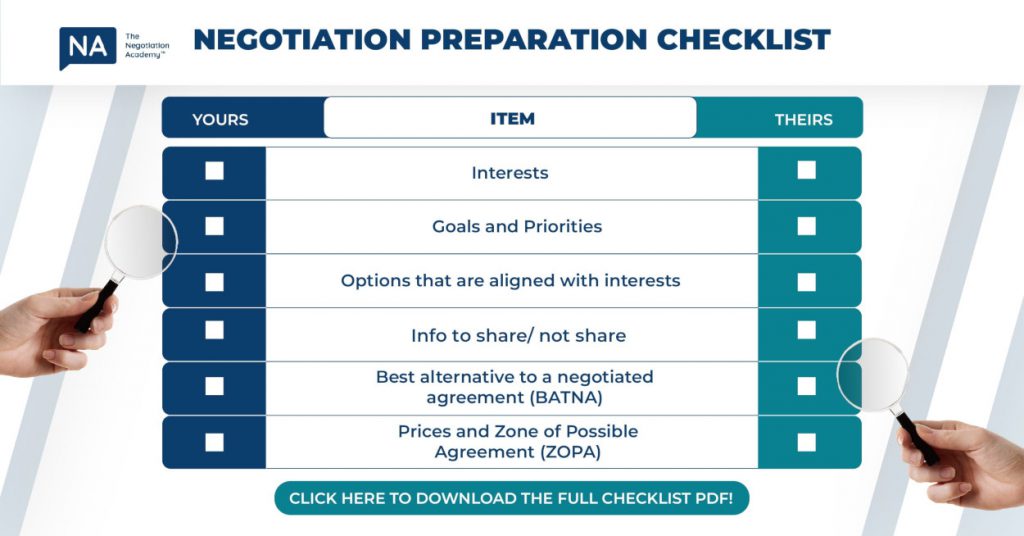
Negotiation Skills Rule 101: You don’t prepare, you don’t succeed.
When studying for your law degree, have you ever tried sitting for an exam without studying?
Even if it’s an open book exam, you won’t remember where the important cases are. Without notes to refer to, your arguments won’t be as strong as they could have been.
Similarly, in negotiations, preparation is considered to be 80% of your success. Yet so many people go into negotiations thinking they can just “wing it.”
This is how even younger negotiators can outperform more experienced negotiators: By realizing that experience doesn’t necessarily translate into expertise. And that smart negotiation preparation trumps them both.
Let’s dive into how to prepare based on the 6-step preparation worksheet we use in our courses (you can download it for free here)
Getting ready like a pro
I believe it was Muhammad Ali who said something along the lines of:
“I’ve never won a battle in the ring, always in training.“
In negotiation like in sports, most of your success gets determined by what you do before you even enter the ring, ahem, conference room.
But unlike professional sports, most “professional negotiators” have no idea about the preparation game that the more successful people around them are playing (and if they are really good, you will never know that they just got a much better deal than you ;))
Here is your 6-step game preparation plan
1. Interests
Interests refer to ‘why’ a party wants what it wants. This is different from a position that is ‘what’ it wants.
When representing a client, you need to speak with them to find out not just their position but, more importantly, why they are asking you for a certain action and what it means for their business.
Similarly, researching your counterparty can give you an idea of what positions they are looking for and the underlying reasons.
The better you understand your clients’ and the other side’s interest, the better you are positioned to expand the pie by offering new options that meet everyone’s interests in a more optimal way.
2. Goals and Priorities
To optimize your interest focus, where to push, and where to value trade, you want to figure out what parts of your position are critical, ideal or can be traded off for concessions.
Separating your interests into an M.I.T. list helps you prioritize:
- Must have issues are your 2-3 non-negotiable interest. If you don’t get those needs met, you will leave the table.
- Ideal goals are your stretch goals. Another 7-10 issues that optimally you would love to achieve, but are not dealbreakers.
- Tradeable are issues that you have identified of interest to you, but not at a high priority, and so you are willing to trade those away for matters of higher interest to you first.
Now, Step 2: What do you think are those on the other side?
Once you’ve listed them out, we can go to step 3.
3. Creating Options That Are Aligned with Interests
Now that we have an idea of what both sides want, we can create options that align with both sides. Options refer to potential outcomes that align with a specific interest. In a negotiation, different options can be mixed and matched into different offers.
All the work you’ve done in step 2 comes into play here, especially knowing what we must have, what the ideal outcome could look like, and what we could give away. When you compare the options, it’ll give you some idea on how to make them work for the options they want while you consider how to get to your own.
During the negotiation itself you’ll learn more information on their interests and desired options. You can then adjust your options lists and strategy accordingly, such as seeing if there is room to grow the pie further or to push for what we want. You can read more about interests here.
4. Information Gathering and Giving
Trust is created the fastest when information is shared. To build trust, you need to be ready to go first. Having prepared what you can share should help you get away from your natural default of not sharing (“this is ALL confidential!!”).
Of course, don’t give away everything at once, but start small and create reciprocity. If done right, this will open up communications with the other side to eventually find out their interests, prices, and other information you can use to get the outcome you want.
Reciprocity plays a big part in building rapport and eventually trust with your counterparty. Preparing what information you can share gets you there the fastest.
5. Negotiation Power
Power in negotiations comes from how much we need – or don’t need – the counterparty.
In negotiations, this power is denoted as the ‘Best Alternative to a Negotiated Agreement’ (BATNA) or a plan B.
To prepare and boost your bargaining power, you need to ask:
- What options do we have if this negotiation fails?
- How can we improve our BATNA?
- What is their perception of our BATNA?
Similarly, if we can find out what our counterparty’s BATNA is, it can tell us how far we can push. To find that out, start with these questions:
- What might they do if the negotiation fails?
- Do we have information that influences their BATNA?
6. The Three Numbers
Knowing your target and limit prices and your counterparty’s limit prices will help you gauge how far you can push in your negotiations.
If you haven’t already, you can get our pdf version of the preparation sheet here.
The three numbers you need to prepare are:
- Limit price, i.e. the max you are willing to pay or take [see this Negotiation Nugget for how to calculate that]
- Target price, i.e. your concrete dream outcome [see this Negotiation Nugget for how to set a smart target]
- Opening price [see this Negotiation Nugget for details on opening offers and the powerful Anchoring effect]
There are many other elements that you can research and prepare for negotiations, but starting with these default elements like the underlying interests of both parties, goals and priorities, walkaway points, and bargaining power (BATNA) will significantly improve your chances of success.
To your negotiation success!
If you enjoyed this content, join our free 10-week Email course on the fundamentals of Collaborative and Competitive Negotiation skills by clicking HERE.
Each week, you will get a bite-size email unpacking some of the most fundamental negotiation concepts that you can apply in your everyday negotiations, along with an insight video and book recommendation to go further in areas you want to learn more about.
Want to learn more about effective preparation and how you can beat even more senior negotiators? Joining one of our online courses or organizing a tailor-made live training session for your organization will put you en par with over 10,000 leading lawyers from Fortune 500 companies to Tier 1 law firms globally.
Just reach out to me at claudia@necademy.com to discuss!



